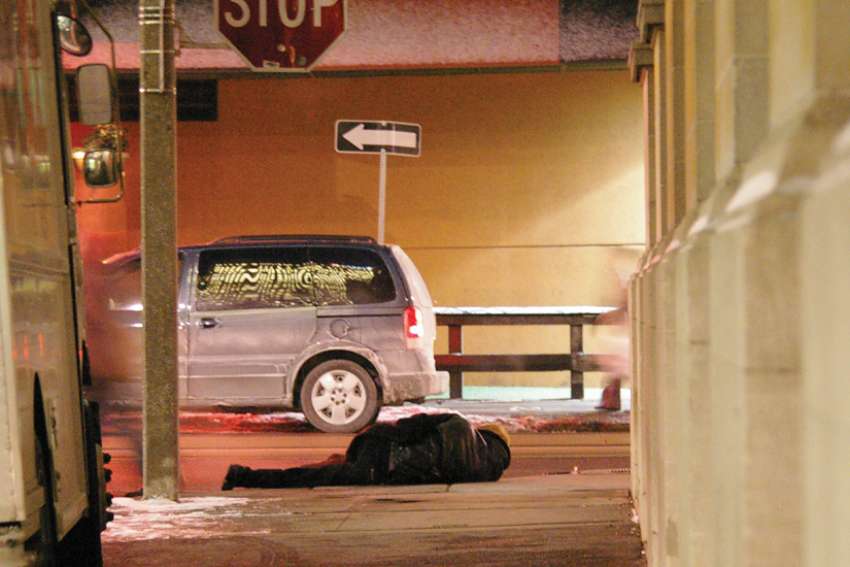I quickened my step to catch up with the man, and as I approached, I could see that he had one pantleg rolled up, exposing a severely disfigured leg. As I caught up with him, he turned and said, “Hello Father, what are you doing on these streets?” I explained the ministry on the street and said to him, “More importantly, what happened to you? It looks like you have a serious leg problem.”
“Ah this,” he said, “I came here from Guyana quite a few years ago looking for a better life and things were going well. You know, labouring jobs and things like that, and then a year ago I got beat up on the street, just down the road from here, and they left me with my leg like this. Now I am in a shelter because I can’t look after myself anymore. I need the support I can get there.”
He spoke with no tone of self-pity or vengefulness as we chatted and as we parted company he said, “Praise God that I have all the support I need. I just pray to God. Jesus is the Lord. Thank you for walking with me and listening.” I was left to ponder if my faith would remain as strong if adversity hit me.
My self-reflection was quickly shattered as a young man emerged from an apartment building shouting to nobody in particular. He ran past me up the street and lunged at a 12-foot-high wire fence surrounding the remains of a derelict house. He hit the fence with a thud and fell back spreadeagled on the ground. Undaunted, he made another attempt with the exact same result, but this time he did not get up. He lay there, and as I started to make my way towards him, he leaped to his feet, shadow-boxed an imaginary opponent and then sauntered up the road to the same shelter as my friend.
Such is the Church on the Street, as I move from one who is an oasis of calm, to one seemingly possessed by some internal demons.
It was not long until I bumped into a young lady I mentioned in a previous column who seemed to me to be just starting out on her life as a prostitute. I had hoped I could meet her again so that perhaps she would have second thoughts on embarking on such a morally and emotionally dangerous practice. Her face lit up when I remembered her name and she was excited to enter into conversation.
I mentioned my concern for her wellbeing, and suggested that she was too young to be on the streets like this. “I’m not on the streets,” she said, and immediately crossed the street to proposition another man.
I have met her several times now, but each time as soon as I say I have no money for her, she turns and walks away. The wisdom of experience is that I have seen others like her in the past and if I keep showing up, then perhaps someday she will be ready to talk.
A block away I met Scarlett, who is on the other end of the experience spectrum. We have met often, and she is a veteran of the streets. “I am worried about you, Scarlett, how are you doing in these COVID days? Have you never thought of giving this up?”
“Well,” she laughed, “business is slow I have to say, but I manage and I just have to be careful. Why would I give it up? I have to do something and it’s OK out here.”
I looked at her intensely and said, “I keep praying for you Scarlett, you are a beautiful person and I just don’t want to see you hurt.” “I’ll pray for you too,” she said, and with that she crossed the road to talk to a man eyeing her from his car.
Recently I heard a speaker say that we beg Jesus for mercy, but the truth is that Jesus reverses these roles, and through the poor and powerless it is He who begs us for mercy. As I turned to go home after a long evening, I was reminded that in the Church on the Street sometimes it is easier than others to recognize this truth.
(Kinghorn is a deacon in the Archdiocese of Toronto.)


